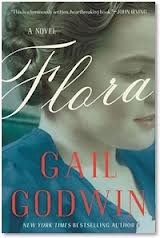 FLORA by Gail Godwin
FLORA by Gail Godwin
Bloomsbury, May 2013
If this book were a fable, it would be “How Helen Learns to Feel Remorse.” There are stories from the past told by Nonnie and Flora and Finn, but mostly there is the story told by Helen herself about the summer of 1945 when she was isolated at home in NC with her dead mother’s cousin Flora as guardian while her father went to work over the mountain in Oak Ridge, TN. Flora is an innocent from Alabama, a 22-year-old graduate of teacher’s college preparing for her first classroom, glad to have a summer job looking after her cousin’s 10 year old daughter, and eager to do everything just right. But there is no pleasing Helen that summer. Her beloved paternal grandmother, Nonnie, has just died, her father has gone away to work on a secret government project, and the polio scare has quarantined her at home with Flora. Home is “Old One Thousand”, a big crumbling house that her grandparents and their son shared with the Recoverers, former patients of local sanatoriums for TB, alcoholic, and mental patients. These are long gone, but Helen knows them all from Nonnie’s stories. She first meets Flora at Nonnie’s funeral, where she is embarrassed by the easy and constant tears of her mother’s cousin. A 70-year-old Helen narrates the story in the voice of her 10-year-old self, a grumpy self-important child with a great imagination. Helen feels superior to Flora, and indeed to everyone else. But she is sorely tested by this summer, and it does not end well. One outsider who visits their mountain top home is Finn, an Irish-American veteran who delivers the groceries on his motorcycle and stays for dinner and draws their portraits. Both Helen and Flora fall in love with him. He tries to teach Helen to be adventurous, and Flora to drive Nonnie’s car. Seeing Flora through Helen’s eyes, it takes a long time to discover the value of her kindness, simplicity and “single-heartedness”. Flora tries to tell Helen stories about her mother’s people in AL, but Helen does not want to listen or understand; she never knew her mother, and she is determined to demean Flora. Poor Helen. She’s a child and she just does not see with an adult’s comprehension how she is both instigator and victim of tragic events that close the novel. There are other characters whose portraits are skillfully drawn in this book, such as Beryl Jones, Harry Anstruther and Old Mongrel Earl Quarles, but Nonnie, Helen and Flora are the focus. Helen gets to keep the letters Nonnie wrote to encourage Flora to have the self-confidence she needed (“Others judge you at your own estimation”) and she absorbs material for her career as a writer. Helen is smart, so she knows that remorse is necessary, and it follows her throughout her life. Readers will enjoy meeting these people and seeing life in a time that now seems incredibly remote, and they too will learn something valuable.
